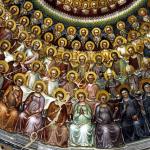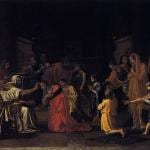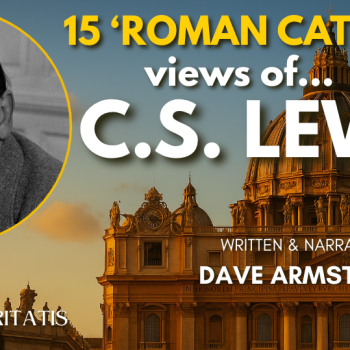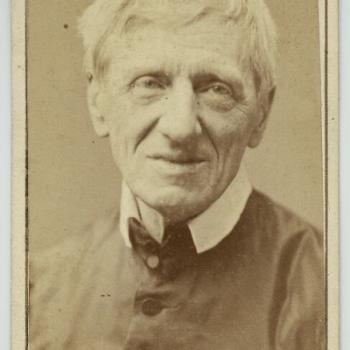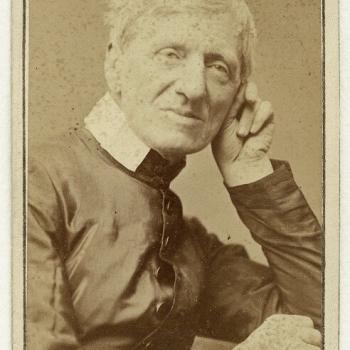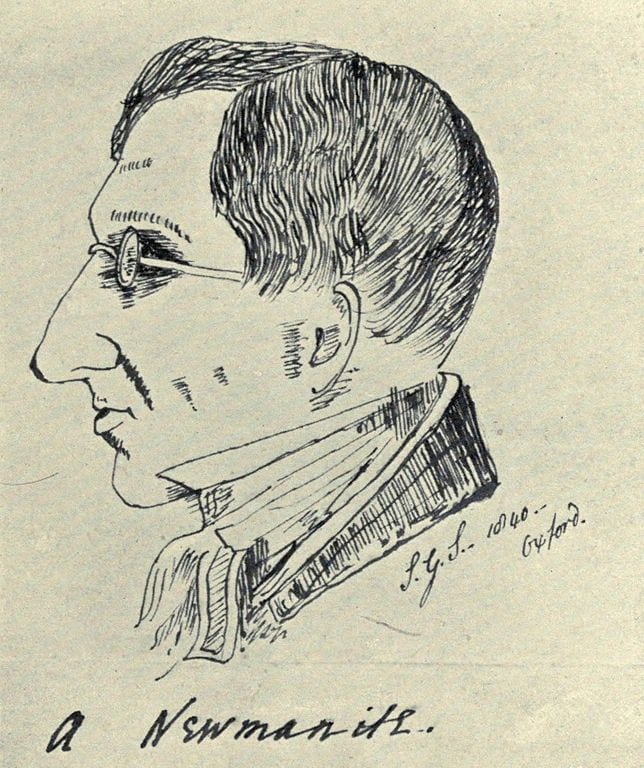
The simple case then, much as I grieve to say it, is this: – about two years and a half ago I began reading the Monophysite controversy, and with great concern and dismay found how much we were in the position of the Monophysites. I am not saying there is anything peculiar in their history, but merely that it put me into a new train of thought. After that I turned my mind to the Donatists, and there the same truth, or a parallel one, came out in the strongest colours. In the Monophysite history it is that the Church of Rome, in the Donatist that that body which spreads through the world, is always ipso facto right. I am not measuring my words as if I were arguing, but giving you my line of thought. Since then whatever line of early history I look into, I see as in a glass reflected our own Church in the heretical party, and the Roman Church in the Catholic. This is an appalling fact – which, do what I will, I cannot shake off. One special test of the heretical party is absence of stay or consistence, ever crumbling ever shifting, ever new forming – ever self consumed by internal strife. Our present state, half year by half year, the opposition of Bishop to Bishop, is a most miserable and continual fulfilment of this Note of error. . . . Another is a constant effort to make alliance with other heresies and schisms, though differing itself from them. . . . This has led me anxiously to look out for grounds of remaining where Providence has placed me . . . It has also forced me back upon the internal or personal Notes of the Church; and with thankfulness I say that I have received great comfort there. But, alas, in seeking to draw out this comfort for the benefit of others, who (without knowing my state) have been similarly distressed, eager inquisitive sensitive minds have taken the alarm, and (though I acted with the greatest anxiety and tried to do what I could to avoid the suspicion) they are beginning to guess that I have not an implicit faith in the validity of the external Notes of our Church. . . . One obvious consequence is to be mentioned besides – a growing dread lest in speaking against the Church of Rome I may be speaking against the Holy Ghost. This is quite consistent with a full conviction of the degraded state of that Church whether here or elsewhere. . . . my fears slept for very many months, and have only lately been re-animated by our dreadful divisions, the Bishops’ charges, and this Prussian affair, . . . You are the first person to whom I have drawn it out. . . . Of course this painful thought comes into my mind – whether, if Rome be the true Church, the divinely appointed method of raising her from her present degradation be not to join her. Whether either she or we can correct our mutual errors while separated from each other. (Letters & Diaries [as throughout], v. 8; To Robert I. Wilberforce, 26 Jan. 1842)
I wish to be guided not by controversy but by ethos – so that (please God) nothing would seem to me a reason for so very awful and dreadful a step as you point at, but the quiet growth of a feeling through many years. I may sincerely say that no one has exerted himself more than I have to make a case for the English Church and theory, from the Fathers – perhaps (following our divines) I have succeeded – but I mean that I have honestly set myself to it and spared no pains. I really think I have examined and replied to more objections than most people. I don’t think argument will help me. (v. 8; To Robert I. Wilberforce, 1 Feb. 1842)
I advise you to be very much on your guard about the approaching visit of Dr Wiseman. You may be committed before you know where you are. Do consider that you are about to be submitted to temptation; that is, the temptation of acting, not on judgment but on feeling. Your feelings are in favor of Rome, so are mine – your judgment is against joining it – so is mine. Yet I would not trust myself among R[oman] Catholics without recollecting how apt feeling is to get the better of judgment – and I warn you of the same. I remind you, as I should wish to remind myself, of the necessity of keeping a strict watch over yourself. (v. 9; To Miss Holmes, 8 Feb. 1843)
[W]hat influence I exert is simply and exactly, be it more or less, in the direction of the Church of Rome – and that whether I will or no – What men learn from me, who learn anything, is to lean towards doctrines and practices which our Church does not sanction. There was a time when I tried to balance this by strong statements against Rome, which I suppose to a certain extent effected my object. But now, when I feel I can do this no more, how greatly is the embarrassment of my position increased! I am in danger of acting as a traitor to that system, to which I must profess attachment . . . I am conscious too, as I have said above, that I am not advocating, that I am not promoting, the Anglican system of doctrine, but one very much more resembling in matter of fact, the doctrine of the Roman Church. (v. 9; To John Keble, 14 March 1843)
In June and July 1839, near four years ago, I read the Monophysite Controversy, and it made a deep impression on me, which I was not able to shake off, that the Pope bad a certain gift of infallibility, and that communion with the see of Rome was the divinely intended means of grace and illumination. I do not know how far I fully recognized this at the moment, – but towards the end of the same Long Vacation I considered attentively the Donatist history, and became quite excited. It broke upon me that we were in a state of schism. Since that [then], all history, particularly that of Arianism, has appeared to me in a new light, confirmatory of the same doctrine. In order to conquer this feeling, I wrote my article on the Catholicity of the English Church, as I have written other things since. For awhile my mind was quieted; but from that time to this the impression, though fading and reviving, has been on the whole becoming stronger and deeper. At present, I fear, as far as I can realize my own convictions, I consider the Roman Catholic Communion the Church of the Apostles, and that what grace is among us (which, through God’s mercy, is not little,) is extraordinary, and from the overflowings of His Dispensation. I am very far more sure that England is in schism, than that the Roman additions to the Primitive Creed may not be developments, arising out of a keen and vivid realizing of the Divine Depositum of faith. (v. 9; To John Keble, 4 May 1843)
If I have been very bold in nearing the Roman system, this has risen mainly from over-secure reliance on our position, and from a keen impression of our great need of what the Roman system contains. . . . my present feelings have arisen naturally and gradually, and have been resisted. (v. 9; To John Keble, 18 May 1843)
Do you know, though you need not say it, that I have taken to liking the Jesuits? (v. 9; To Henry Wilberforce, 9 June 1843)
There is no doubt at all that I am approximating towards Rome; nor any doubt that those who are very much about me see this, little as I wish it. (v. 9; To Mrs. William Froude, 28 July 1843)
The truth then is, I am not a good son enough of the Church of England, to feel I can in conscience hold preferment under her. I love the Church of Rome too well. (v. 9; To James P. Mozley, 1 Sep. 1843)
I do so despair of the Church of England, I am so evidently cast off by her, and, on the other hand[,] I am so drawn to the Church of Rome, that I think it safer, as a matter of honesty, not to keep my living. This is a very different thing from having any intention of joining the Church of Rome. . . . People cannot understand a state of doubt, of misgiving, of being unequal to responsibilities etc – but they will conclude either that you have a clear view one way or the other. All I know is, that I could not without hypocrisy profess myself any longer a teacher in and a champion of our Church. (v. 9; To [sister] Harriet Mozley, 29 Sep. 1843)
My present views were taken up in the summer of 1839 upon reading the Monophysite and Donatist controversies. I saw from them that Rome was the centre of unity and the judge of controversies. (v. 9; To [sister] Harriet Mozley, 2 Oct.? 1843)
I think the Church of Rome the Catholic Church, and ours not a part of the Catholic Church, because not in communion with Rome, and feel that I could not honestly be a teacher in it any longer. This conviction came upon me last summer four years. I mentioned it to two friends in the autumn of that year, 1839. And for a while I was in a state of excitement. It arose in the first instance from reading the Monophysite and Donatist controversies; in the former of which I was engaged in that course of theological study to which I had given myself. . . . that wretched Jerusalem Bishoprick affair, no personal matter, revived all my alarms. They have increased up to this moment. . . . the various ecclesiastical and quasi-ecclesiastical acts, which have taken place in the course of the last two years and a half, are not the cause of my state of opinion; but are keen stimulants and weighty confirmations of a conviction forced upon me, while engaged in the course of duty, viz the theological reading to which I have given myself. (v. 9; To Henry Edward Manning, 25 Oct. 1843)
The early Church has all along been my line of study – and I am still occupied upon it. For some time, I suppose, I shall be upon the ’the Arians’ and the second part of the volume of St Athanasius. It is this line of reading, and no other, which has led me Romeward. Not that I read it with that view. I wish to resist, as I always have – and think it a duty. I am sure, if it be right to go forward, I shall be forced on in spite of myself. . . . What I wish is, not to go by my own judgment, but by something external, like the pillar of the cloud in the desert. Such is the united movement of many. . . . If my thoughts have been led through the early Church to Rome why should not others? . . . I hope I am not wrong, – but I have lately been praying that ’if I am right, Pusey, Manning etc may be brought forward; but if Pusey, Manning etc are right, I may be brought back – that nothing, if it be possible may separate us.’ (v. 10; To John Keble, 23 Jan. 1844)
I am in no perplexity or anxiety at present. I fear that I must say that for four years and a half I have had a conviction, weaker or stronger, but on the whole constantly growing, and at present very strong, that we are not part of the Church. I am too much accustomed to this idea to feel pain at it. I could only feel pain, if I found it led me to action. At present I do not feel any such call. . . . It was the Monophysite and Donatist controversies which in 1839 led me to this clear and distinct judgment. (v. 10; To Edward B. Pusey, 19 Feb. 1844)
People kindly think that I have much to bear externally – disappointment, slander, etc., No, I have nothing to bear but the anxiety which I feel for my friends’ anxiety for me and [[their]] perplexity. (v. 10; To John William Bowden, 21 Feb. 1844)
***
Unfortunately, Money Trees Do Not Exist: If you have been aided in any way by my work, or think it is valuable and worthwhile, please strongly consider financially supporting it (even $10 / month — a mere 33 cents a day — would be very helpful). I have been a full-time Catholic apologist since Dec. 2001, and have been writing Christian apologetics since 1981 (see my Resume). My work has been proven (by God’s grace alone) to be fruitful, in terms of changing lives (see the tangible evidences from unsolicited “testimonies”). I have to pay my bills like all of you: and have a (homeschooling) wife and three children still at home to provide for, and a mortgage to pay.
My book royalties from three bestsellers in the field (published in 2003-2007) have been decreasing, as has my overall income, making it increasingly difficult to make ends meet. I provide over 2500 free articles here, for the purpose of your edification and education, and have written 50 books. It’ll literally be a struggle to survive financially until Dec. 2020, when both my wife and I will start receiving Social Security. If you cannot contribute, I ask for your prayers. Thanks! See my information on how to donate (including 100% tax-deductible donations). It’s very simple to contribute to my apostolate via PayPal, if a tax deduction is not needed (my “business name” there is called “Catholic Used Book Service,” from my old bookselling days 17 or so years ago). May God abundantly bless you.
***


